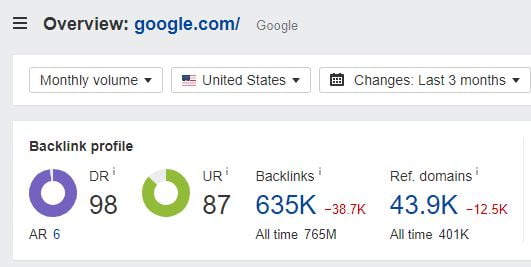Determining a website's authority and influence is key for evaluating link-building prospects as well as your own SEO standing. Backlink analysis tools provide the data you need to quantify authority.
I'll walk through exactly how to assess domain and page-level authority using metrics like domain rating and URL rating. Let's shine some light on how authoritative your site stacks up!
Why Website Authority Matters
First, let's cover why website authority should be on your radar in the first place. Understanding authority helps with:
- Finding the best link prospects for outreach. Domain authority correlates strongly with ranking power potential.
- Benchmarking competitors. See who has the highest authority scores in your niche.
- Tracking your own progress by monitoring authority over time.
- Identifying "toxic" low authority sites to avoid for safety.
In short, authority equals trust and credibility in Google's eyes. The higher the authority, the more value placed on links to boost rankings.
Check Domain Rating
One of the best authority metrics is Domain Rating found in Ahrefs and SEMrush.
This 0-100 score encapsulates a domain's link profile strength, citation pedigree, and aggregate ranking signals. Higher = stronger authority.
Aim to build links from sites with a Domain Rating above ~30. Anything below 10 starts getting shaky.
Compare your Domain Rating to competitors to see where your overall authority stands.

Assess URL Rating
You can also check authority at the page-level using URL Rating. This gauges the authority passed from a specific page.
For example, the homepage may have a higher rating than deeper pages. Focus on securing links from high URL rated pages.
URL Rating can also diagnose issues with thin or weak pages that damage site authority. Boost their content quality to improve the rating.
Analyze Backlink Counts
The number of referring domains and total backlinks are key authority indicators too.
More backlinks = higher authority in Google's eyes generally. But it's specifically links from reputable and relevant sites that really move the needle.
Compare your competitors' backlink counts to yours to size up differences in domain authority.
Review Additional Metrics
Tools like Ahrefs and SEMrush offer many more authority metrics to incorporate into your analysis:
- Referring domains to page ratio
- Domain age
- Organic traffic
- Keyword difficulty rankings
Factor these in to get the full scope of a domain's authority foundation.
Track Authority Changes Over Time
You can also monitor your Domain Rating and URL Ratings over time to spot positive or negative authority fluctuations.
This helps you evaluate the impact of link-building efforts as well as diagnose issues causing authority dips.
Consistency is key when tracking authority. Pick 1-2 tools and check regularly.
Get Authority Analysis Savvy
There you have the blueprint for gauging site authority like a pro! With backlink tools providing authoritative data at your fingertips, you can easily identify high-value link prospects and power up your own domain authority.


